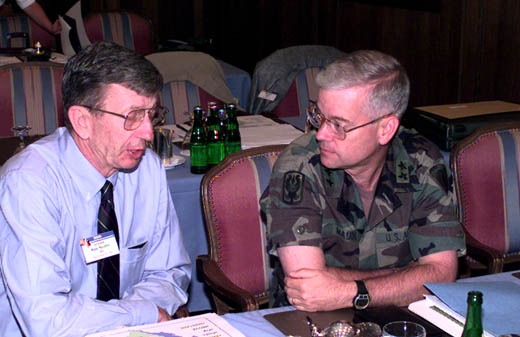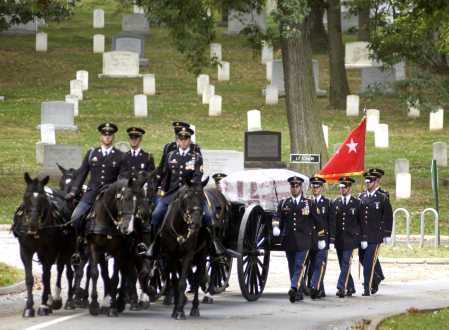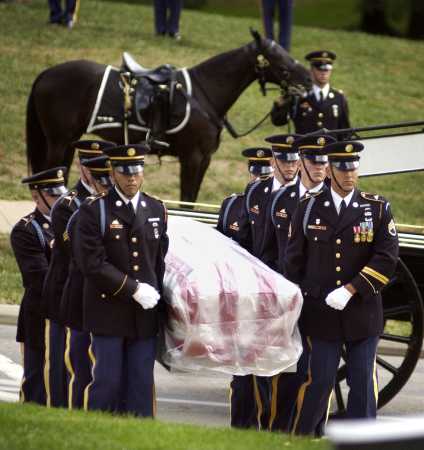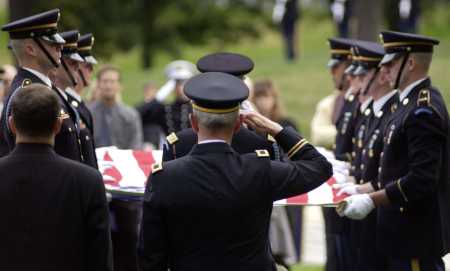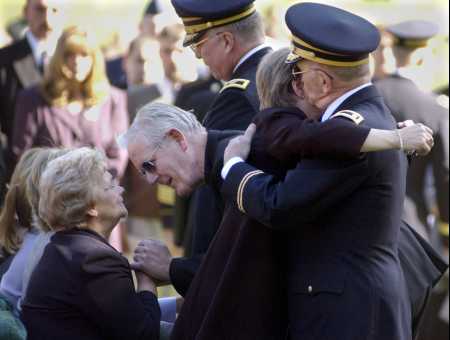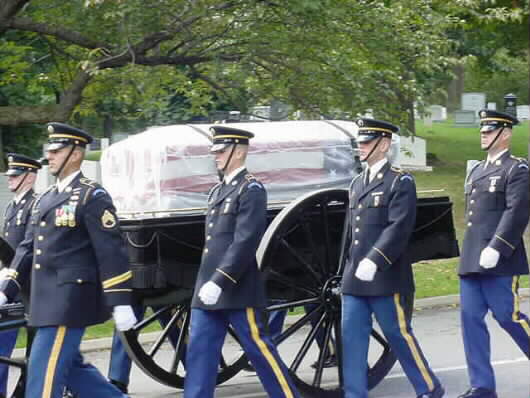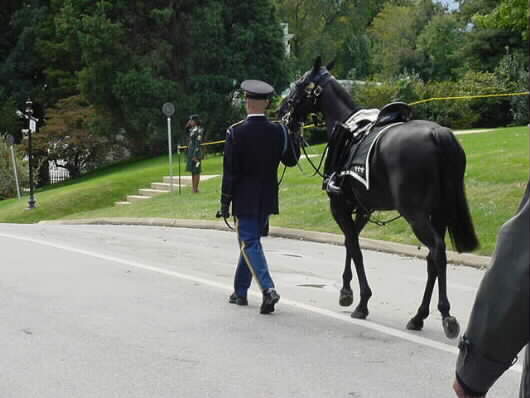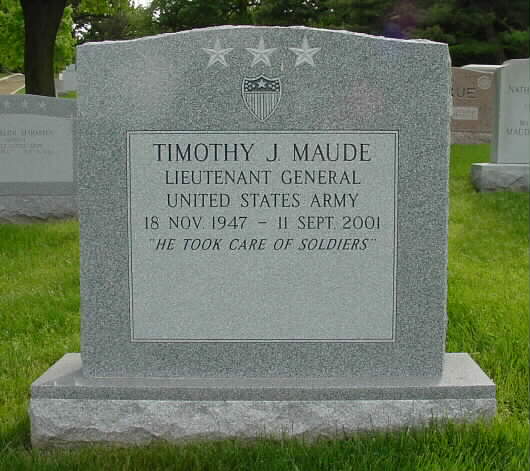
On 20 September 2001, the Defense Department confirmed that Lieutenant General Timothy J. Maude was among those killed in the terrorist attack on the Pentagon.
General Maude was laid to rest in Arlington National Cemetery on Saturday, 6 October 2001.
September 22, 2001
Lieutenant General Timothy L. Maude, 53, an Army Deputy Chief of Staff
Lieutenant General Timothy L. Maude, the Army’s deputy chief of staff for personnel, died on September 11 in the attack on the Pentagon, the Department of Defense confirmed yesterday. He was 53 and lived in Fort Myer, Virginia.
General Maude was appointed to the position and promoted to his current rank in May 2000. His chief focus recently was improving recruitment, which began to lag in the 1990’s.
Early this month, he reported that the new “Army of One” recruiting campaign, which began in January with major advertising on television and on the Internet, was succeeding in drawing young people to military service.
On September 4 the Army announced that it had attained its recruiting goals for
active-duty Army personnel ahead of schedule and that the Army Reserve and the Army National Guard would fulfill their recruiting targets by the end of the month.
General Maude was born in Indianapolis, attended the Latin School, a seminary high school there, and was a graduate of Ball State University in Muncie, Ind. He went through officer candidate school in the Army, was commissioned a second lieutenant in 1967 and started out as a postal officer.
He served a year in Vietnam and won the Bronze Star. His later duties involved personnel matters in Germany, South Korea and the United States.
He is survived by his wife and two daughters.
American Flight 77 was commandeered by four hijackers after it left Dulles International Airport in Northern Virginia for Los Angeles on Tuesday.
At some point it doubled back and plowed into the Pentagon killing at least 190 people, including the 64 people on the doomed flight.
The highest-ranking victim appears to have been a three-star general who was the Army’s personnel chief, a defense official said.
DoD, Army Release Names of Missing Personnel
September 14, 2001 — DoD and Army officials today released the names of 84 persons still unaccounted following the September 11 terrorist attack on the Pentagon. The two new lists complete the roll of 126 unaccounted for persons reported yesterday by department officials.
DoD officials today released the names of 10 persons from defense agencies who are still unaccounted for. At the same time, the Army released its list of 74 military and civilian personnel. The Navy released its list of 42 yesterday. In all, 190 people are unaccounted for, including 64 passengers aboard the hijacked airliner that crashed into the Pentagon.
“The entire Army family, indeed the entire nation grieves with all of us in this dark hour,” Army Secretary Thomas White said in a Pentagon press briefing.
Eight soldiers and nine Army civilian employees are still in three area hospitals, Army officials said.
Army Chief of Staff General Eric K. Shinseki said the tragedy was “was an attack against all that we embrace, the principals of peace, freedom and democracy.”
But, he added, it will not beat our Army’s spirit down. “Any attack against our people … may stun temporarily, but the nation will prevail,” he said.
Three Army agencies were in the area affected by the crash and fire: the offices of the deputy chiefs of staff for operations and personnel as well as some administrative support offices, White said.
Lieutenant General Timothy J. Maude, the service’s deputy chief of staff for personnel, is among those still unaccounted for.
Shinseki said these losses have caused the Army family “pain and anger.” The pain, he said, is obvious. “The anger on our part is that this has happened to this great and wonderful country that has such high principals,” he added.
‘He loved the Army. He loved his soldiers’
by Mary Beth Wagner, Staff writer
Carol Webb was opening her Greenfield business the morning of Sept. 11 when she heard a radio report about a plane crashing into the World Trade Center. She was stunned by the news, but continued with her usual routine at Seven Seas. When attention shifted to the Pentagon 45 minutes later, Carol’s whole life, not just her morning stopped in its tracks. The Pentagon was home to the office of her brother, Lieutenant General Timothy J. Maude, the Army’s deputy chief of staff for personnel. Waiting for word Carol had just seen her daughter, Jean, married an September 8. Jean was honeymooning in Florida with her new husband, Brian, and her brother, Mike, and his wife.
In the span of a few moments, the whole family hit bottom. Carol learned of the Pentagon crash with a panicked phone call from her mother, Dolores, who lives in Cumberland.
Dolores told Carol a plane has hit the Pentagon, but she didn’t know the location. For most Americans, that strike on the heart of military operations was shocking enough. For Carol’s family, it was if a missile itself had hit their homes and hearts. Carol’s husband, Kenny, rushed to bring a television to the business. “My heart went to my stomach’ she said. “I didn’t know what to think.”
While Carol waited anxiously for the TV, her mom called to tell her the exact section of the Pentagon on which the hijacked plane ended its final dive. But she needed to see the TV to be sure. She felt frustrated when most of the news coverage centered on the World Trade Center, offering little information about the scene at the Pentagon. When Kenny finally brought in the set, Carol was relieved to see the site wasn’t where his office was. Carol turned off her computer and headed to her mom’s house, where her other siblings had left their workplaces to gather and wait in hope. When they didn’t hear from Tim, Carol reasoned he was secretly taken away in safety because of his rank, perhaps included in classified emergency discussions marking out America’s response. But his rank was the reason his office had just been moved to the newest section of the Pentagon. While the family sat on pins and needles, Tim’s wife, Teri, who worked in the family support division and was away on business in California, was picked up by a military jet and taken to Washington, D.C. Teri called the family later with words of hope that Tim’s meeting schedule might have kept him out of harm’s way; but as the next few days dragged by without word the family began to realize he would not be coming back.
The only official notification they received was from two generals who came to Dolores’ house to say Tim’s status was unknown. “We knew his status was missing before the military guys showed up.” Carol said. Before they had any solid information from the military, the national news had already presumed him dead.
They were angry at the news for blurting out their assumptions and chose to go with the opinion of Teri, who said she did not believe in her heart that her beloved husband was gone.
“Until Saturday, there was still hope.” said Carol. That’s when Teri, her two daughters and son-in-law returned from visiting the Pentagon. “Teri determined that Ground Zero was my brother’s office, Carol said “He was having a meeting with five other people.”
“That really helped a lot,” said Carol, whose whole family was on a roller coaster ride, there emotions rising and falling with every national news report. The family decided they would go back to work and go about life as best they could until Tim was found and arrangements were made.
Every night since that Tuesday, the family has met at Dolores’ house to eat meals dropped off by sympathetic friends, to be comforted by each other and Dolores’ home-cooked meatloaf.
“There’s still part of me that would like him to be found in a little cubbyhole somewhere and come back to us,” said Carol, adding that waiting is the hardest part.
Even though she believed Tim had indeed been one of the victims after Teri’s somber report, Carol still wavered between talking about her brother in present and past tense, indicating a glimmer of hope.
An answer
She called the Daily Reporter Friday morning to say her brother’s death had been confirmed and that he would soon be buried at Arlington National Cemetery. The Pentagon had not released any further details to the family.
“We know that they have him. He’s not still lost,” Carol said, “but it doesn’t make it any easier.
The national news reports tout Tim as a high-ranking official. The networks run his Army photograph with his title and age underneath. They don’t tell the real story of a man who worshipped his girls and his wife, who despite his career elevation, always returned home for Thanksgiving or Christmas in Indiana.
The local television stations don’t report that Tim had intended to be a priest, not a military man. He even graduated from Latin school in Indianapolis in preparation for the seminary.
Carol doesn’t know what changed her brother’s mind. He went to sign up for the draft and enlisted instead, worrying his mother. From then, he devoted himself to his military career. Carol remembers Tim as dedicated and fiercely patriotic. “He loved the Army,” she said “He loved his soldiers.”
He so enjoyed his career that he couldn’t wait to go to work, sometimes rising a t 3 a.m. to work until 8 p.m. His promotion to three-star general was the pinnacle of his 34 year career. He was nominated for the honor by William S. Cohen, former secretary of defense. When his promotion was celebrated in the Hall of Heroes in the Pentagon, everyone in the family came to share in the joy along with the many dignitaries present.
“He made his family very much a part of his promotion”, Carol said, noting that he was on cloud nine. “He still had to work that day.”
In the photos taken that day with Teri and daughters Karen and Kathy, his face is beaming, his teeth showing a mile-wide-smile. While most people who weren’t aquatinted with Lieutenant General Timothy Maude will remember him for his military achievements. Carol will remember him as her brother, Tim. She recalls sitting for dinner together growing up; going on the family shopping trip every Friday night; and playing at their home on the east side of Indianapolis where they spent their childhood, back when it was still rural. She is overwhelmed when asked what he was like growing up what their relationship was like.
“I can’t sum him up,” Carol said. “Tim was Tim.”
Carol wishes she had more time with her brother. His 53 years were just not enough. The last time the entire family was together, Carol recalls, was her mother’s surprise 75th birthday surprise party on November 4, 200. “I guess it’s human nature,” Carol said, “You always want more when you can’t have more.”
Patriotic songs have a deeper meaning now. The familiar tunes flooding the radio and the show of community support help soothe her sorrowed soul. “I think it’s great,” she said, “It’s just too bad a tragedy had too happen to pull everyone together.”
Timothy Maude lived that patriotism every day. A man who loved to belt out his favorite songs, Carol’s family just found out the he had recently finished a CD of patriotic music, recorded with a group of his soldiers. It will likely be played at his funeral in celebration of a life devoted to family, faith and country.
Lieutenant General. Timothy J. Maude, U.S. Army, 53, Indianapolis, Indiana
September 13, 2001
Nobody who has worked for Lieutenant General Timothy J. Maude, 53, is willing to give up hope that he is still alive.
Maude, the Army’s deputy chief of staff for personnel, was described yesterday as a sharp officer who has always taken care of the soldiers in his command. He is believed to have been at work on the side of the Pentagon where American Airlines Flight 77 crashed Tuesday morning.
“Right now, everyone here is on pins and needles,” said Shari Lawrence, a spokeswoman for the Army Personnel Command. “It’s just wait and see.”
Maude attended officer candidate school, was commissioned in 1967 as a second lieutenant postal officer and spent one year in Vietnam during the war there. Later, he had various postings in the United States, Germany and Korea.
He has received several decorations, including the Legion of Merit, the Bronze Star and a Defense Superior Service award.
He has been stationed in Washington since August 1998 and was nominated for his current position at the Pentagon almost 16 months ago by then-Secretary of Defense William S. Cohen.
As deputy chief of staff for personnel, Maude has helped steer the Army’s recruitment efforts and has launched reality-based television ads designed to appeal to potential recruits. He has testified frequently before Congress, telling lawmakers that the Army needs more people to complete its missions.
He is married and has two grown daughters. He lives at Fort Myer.
Tim Maude was the military equivalent of a corporate turnaround specialist, the three-star general credited with rescuing the Army from an ominous recruiting slump.
Lieutenant General Timothy J. Maude
Lieutenant General Timothy J. Maude, 53, was the highest-ranking casualty of
Tuesday’s attack.
As the Army’s deputy chief of staff for personnel, Maude orchestrated the “An Army of One” recruitment campaign that is helping the Army meet its recruitment targets after years of lagging enlistments.
The new recruiting pitch replaced the well-known but increasingly ineffective “Be All You Can Be” campaign.
Maude received his third star and his latest advancement in August 2000. Normally, the rank of three-star general is reserved for combat officers, but the Army made an exception for Maude.
“We were in the middle of our worst recruiting year,” said former Secretary of the Army Louis Caldera. “I felt very strongly when the job came open that Tim was the right guy . . . to manage the human resources of an organization that has to hire 80,000 new employees a year.”
Maude spent a year in Vietnam in the late 1960s and was awarded a bronze star. But most of his Army career involved personnel-related assignments at bases in the United States, Korea and Germany.
An avid golfer, Maude was described by associates as a quiet, unassuming man with a wry sense of humor.
“He was a wonderful guy,” said retired General Ted Stroup, who mentored Maude. “This is a real loss to the Army.”
USAREUR center named for general killed at Pentagon
HEIDELBERG, Germany (Army News Service, May 6, 2002) – U.S. Army Europe dedicated a building on Campbell Barracks April 30 as the Lieutenant General Timothy J. Maude Center for Human Resources, honoring the senior-ranking service member killed in the September 11, 2001, terrorist attacks.
From 1995 to 1998, Maude walked through the doors of Campbell Barracks Building 16 almost daily as the USAREUR deputy chief of staff, personnel and installation management.
Maude was the Army’s deputy chief of staff for personnel at the Pentagon when terrorists slammed a jumbo jet into the building.
Maude’s surviving family, his wife Teri, and their daughters Kathleen Koehler and Karen Maude returned to Germany for the dedication. They and USAREUR Commander General Montgomery C. Meigs unveiled the monument that now stands near the entrance to the building. Hundreds of soldiers and civilians – many who remember Maude’s service here – stood by in observance during the dedication ceremony.
“The importance of the Maude building is not the name. It’s the tradition in which the work inside will be done,” Meigs said. “Tim was a master of his trade. And I never went to Tim Maude with a problem that he didn’t give me a solution … ever,” he added.
In an animated speech, Teri Maude described her husband’s easy-going personality. “… I would also like to tell you something else about Tim. He would be so embarrassed by all this … he really would. He didn’t see himself as a visionary. He didn’t see himself as a senior leader. In fact, he told me not too long ago that there were times that he would walk down the halls of the Pentagon … he’d walk by a picture or mirror and see his own reflection with three stars and say, ‘Oh … who’s that!’ He said this because he just didn’t see himself as a three-star general. He always saw himself as a soldier … that’s all he ever wanted to do … or be.”
“It was a very beautiful ceremony and it was nice to find out how much my dad meant to everyone and how much he was loved,” Koehler said.
Major General Dee A. McWilliams, the current USAREUR deputy chief of staff, personnel and installation management, co-hosted the ceremony. Her offices are located in Building 16, where Maude once worked.
“My General Muade was extraordinary – a once-a-generation officer and the best boss I ever had,” McWilliams said. “Lieutenant General Timothy J. Maude understood the human spirit and knew that the well-being of the Army family is inextricably linked to the readiness of the force.”
McWilliams added that Maude enthusiastically touted new Army initiatives such as the “Army of One” recruiting campaign and the donning of the black beret.
“Those who didn’t work for him were often skeptical, cynical, and suspicious. He was formal, intense, concise, and smarter than anyone in the room … but, if you worked for him, it was different – you were on the team. General Maude was a tough, exacting boss who made you understand that the tasks with which we grappled were critical to the strength of our nation and our Army – you knew it was serious stuff. He was truly a mentor – he genuinely wanted your input. He gave you a feeling of personal value to the organization,” McWilliams said.
“I never heard him raise his voice – never saw him lose his temper. Always steadfast and confident, his unmistakable hallmark was an abiding love of soldiers – it was infectious!” McWilliams added.
Maude served for more than 35 years in the Army. He attended officer candidate school and was commissioned in 1967 as a Second Lieutenant. He served in other overseas locations such as Vietnam and Korea. His decorations including the Legion of Merit, the Bronze Star and a Defense Superior Service award. Maude received his third star and his latest advancement in August 2000.
The building named in Maude’s honor at Campbell Barracks was built in 1937 and occupied by the 110th Infantry Regiment of the German army. Known then as GrossDeutchland Kaserne, the compound’s Building 16 was first used as a “sick bay” for injured or sick horses. The facility has been occupied by the U.S. Army since March 30, 1945.
A building at Camp Casey, Korea, was also named after Maude. The 2nd Infantry Division dedicated the Lieutenant General Timothy J. Maude Soldier Support Center on March 11.
There were no fancy plaques or framed pictures when Army Lieutenant General Tim Maude presided over Pentagon ceremonies for officers moving on to new positions.
Instead, Maude, chief of Army personnel, would present old metal canteen cups to the honorees.
Soldiers living in the mud can seem quite remote in Pentagon corridors, and the cup, a staple of Army life in the field, was meant to send a message: “When all the smoke clears, don’t forget, this canteen cup is what we’re all about,” said Colonel Philip McNair, Maude’s last executive officer.
“That was almost his mantra: Is this going to help soldiers and families?” said his wife, Teri Maude. “That’s the question he asked constantly.”
Tim Maude was a kid from small-town Indiana who joined the Army figuring he was going to be drafted anyway. The screeners decided he qualified for officer training, and he was sent as a second lieutenant to Vietnam, where he was awarded the Bronze Star.
Assignments followed in California, Germany and Korea, and Maude, a personnel officer, rose high in the ranks. In 1995, he oversaw family support for soldiers sent to Bosnia.
“He would say, ‘If a soldier is there in a foxhole worried about his wife and kids, then he’s not there focused on taking care of his buddy,’ ” his wife said. “He came to believe that soldiering and family issues were one and the same.”
Traveling to Army installations around the world, Maude would seek out soldiers to talk with, keeping his rank quiet when out of uniform. “He never saw himself as a general; he really didn’t,” Teri Maude recalled. “So he never took on any of those airs.”
At the Pentagon, employees would be stunned to find the three-star general wandering through the cubicles asking, “So, what are people doing in here today?”
Maude, the highest-ranking officer killed in the attack, is buried at Arlington. Said Teri Maude, “What we put on his headstone is, ‘He took care of soldiers’ — because that’s what he did.”
- MAUDE, TIMOTHY J
- LTG US ARMY
- VETERAN SERVICE DATES: Unknown
- DATE OF BIRTH: 11/18/1947
- DATE OF DEATH: 09/11/2001
- DATE OF INTERMENT: 10/06/2001
- BURIED AT: SECTION 30 SITE 416 RH
- ARLINGTON NATIONAL CEMETERY
DISPATCHES FROM IRAQ
September 10, 2004: Remembering 9-11
By Captain Steven Alvarez
September 10, 2004
BAGHDAD — One day a few years ago, in a hotel meeting room in Crystal City, Virginia, Lieutenant General Tim Maude walked up to me. I was serving at the Pentagon as a military assistant and he had just delivered a briefing to would-be generals.
“You need to take good care of your soldiers,” he told them. I remember that phrase because it has always been a personal goal of mine, a promise I made to myself when I sought my officer appointment. And I was happy to share the same objective as a three-star general. Maude was then the Army’s deputy chief of staff for personnel.
General Maude’s address that day wasn’t scripted. He spoke from the heart. He had a fondness for soldiers and anytime you ran into him, small talk was guaranteed. As he left, he came up to me. Was I married? What did I do in the Army? Where did I work? He listened attentively as I answered, his aide looking at his watch impatiently, obviously having experienced these delays before.
But General Maude listened even closer after he learned that I had started as an enlisted man. As he left, he told me he’d see me around. And I did see him now and then and he remembered me, saying, “Hey Steve” or “Hey L-T,” as we passed in corridors of the Pentagon.
A couple of months later, General Maude became the highest-ranking member of the U.S. military to be killed in the September 11th attacks.
In many ways, 9-11 is a day I’d like to forget, but each day I try to keep it fresh in my mind, especially while I’m here. We get caught up in our daily lives–school, work, sports, family. And in Baghdad, we get caught up in the mission, getting the job done, staying safe. But we shouldn’t forget.
And I’m here, I think, to prevent something like 9-11 from ever happening again. The way I see it, the United States wasn’t attacked, freedom was. Anyone who is a threat to freedom must be dealt with to protect our way of life. I miss my family. But if being here for a year means that Iraq will no longer be a threat to my son and wife, I’ll gladly stay as long as my country asks.
Some young soldiers have volunteered to join our office here. They’re full of energy and ready to go. Once they get here, I’ll try my best to follow what is inscribed on General Maude’s headstone in Arlington National Cemetary. It honors him and it helps me keep September 11, 2001 top-of-mind.
It reads: “He took care of soldiers.”
Soldiers of the U.S. 3rd infantry based in Ft. Myer, Virginia, escort the casket of Army
Lieutenant General Timothy J. Maude, during the full honor funeral at Arlington National
Cemetery Saturday, October 6, 2001, in Arlington, Va. Maude, 53, a three-star general and
the Army’s deputy chief of staff of personnel, was the highest-ranking casualty of
the terrorist attack on the Pentagon September 11, 2001
Soldiers of the 3rd. U.S. Infantry carry the casket of Lieutenant
General Timothy J. Maude to the burial site in Arlington
National Cemetery.
Soldiers of the U.S. 3rd infantry based in Ft. Myer, Virginia, give a final salute to Army
Lieutenant General Timothy J. Maude, as the flag from his casket is folded during the full
honor funeral at Arlington National Cemetery Saturday, Oct. 6, 2001
Teresa Campbell Maude receives the U.S. flag from Army Chief of Staff Gen. Erik K. Shinseki
during the full honor funeral for her husband, Army Lieutenant General Timothy J. Maude,
at Arlington National Cemetery Saturday October 6, 2001
Dolores Maude of Indianapolis, mother of Army Lieuenant General Timothy J.
Maude, left, is comforted by Lieutenant Colonel Joseph Goureau, as the
widow Teresa Campbell Maude is comforted by an unidentified officer
during the full honor funeral for her husband at Arlington National
Cemetery Saturday October 6, 2001, in Arlington, Virginia.
Photos Courtesy of the Associated Press
Michael Robert Patterson was born in Arlington and is the son of a former officer of the US Army. So it was no wonder that sooner or later his interests drew him to American history and especially to American military history. Many of his articles can be found on renowned portals like the New York Times, Washingtonpost or Wikipedia.
Reviewed by: Michael Howard

